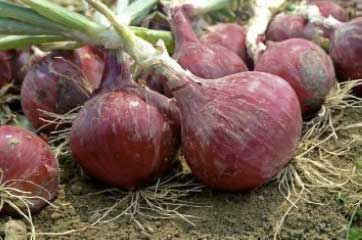|
March 27, 2009
Source:
AVRDC - The World Vegetable
Center Newsletter
Onion (Allium cepa L.) is one of
the most important vegetable crops in the world. Although onion
is a popular crop in rural and urban Africa, yields are
relatively low: 5 million tonnes on 312,840 hectares, compared
with global production of 64,475 million tonnes on 3,451,455
hectares. Widespread reliance on old varieties and imported seed
often poorly adapted to local conditions constrain yield. One
major factor limiting the availability of onion in the region is
poor shelf life. Good storage qualities are critical for a crop
that produces only one harvest a year.
 “The
major factors affecting onion production in Africa include
diseases and pests, and the lack of high-yielding, disease- and
pestresistant varieties with long shelf life, but long shelf
life clearly begins with high quality seed,” says Dr. Albert
Rouamba, vegetable breeder and onion specialist of AVRDC – The
World Vegetable Center’s office in Bamako, Mali. His work on
improving the performance of onion in West Africa is part of the
Center’s “The
major factors affecting onion production in Africa include
diseases and pests, and the lack of high-yielding, disease- and
pestresistant varieties with long shelf life, but long shelf
life clearly begins with high quality seed,” says Dr. Albert
Rouamba, vegetable breeder and onion specialist of AVRDC – The
World Vegetable Center’s office in Bamako, Mali. His work on
improving the performance of onion in West Africa is part of the
Center’s
Vegetable Breeding and Seed Systems for Poverty Reduction in
sub-Saharan Africa (vBSS) project funded by the Bill & Melinda
Gates Foundation. vBSS builds on the Center’s long record of
developing improved vegetable
varieties, and its experience in working with national
agricultural research and extension systems (NARES) and the
private sector.
To assess the performance and potential of improved onion
varieties under West African climate and soil conditions, the
team conducted field trials at the Center’s Samanko station
during Mali’s cool and dry winter season. “We were especially
interested in short-day varieties for adaptability, yield, and
storage, and chose eight onion varieties from seed companies and
NARES,” says Dr. Rouamba. ‘Violet de Galmi,’ currently the best
onion variety cultivated in West Africa, was used as a check.
Field trial yields ranged between 11 and 30 t/ha. ‘Rouge Violet
de Tarna’, a line of ‘Violet de Galmi’ from a small village in
Niger, yielded highest, with 30 t/ha. Unlike the other
high-yielding varieties, ‘Rouge Violet de Tarna’
also stored very well: Around 90 percent of commercial bulbs
were marketable after six months’ storage. “In all our trials we
found that ‘Rouge Violet de Tarna’ and ‘Red Bone’ were the best
varieties in terms of production and storage,” Dr. Rouamba
noted. “However, we will continue our evaluations of short-day
onion varieties, and we will intercross productive varieties
with varieties that demonstrate good storage qualities to
develop composite populations for further tests.” ‘Rouge Violet
de Tarna’ has large, dark violet bulbs. Violet could become a
color for all seasons. |
|